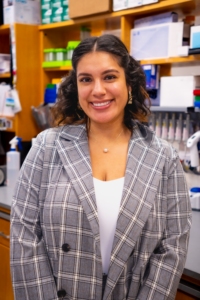Teresa Torres, a Ph.D. candidate in the Department of Pathology, Microbiology and Immunology’s Microbe-Host Interactions program, is the first Vanderbilt graduate student to receive the K. Patricia Cross Future Leaders Award. This award—given by the American Association of Colleges and Universities—recognizes graduate students for their community leadership, commitment to the principles of diversity, equity, and inclusion, and pioneering teaching methods, among other promising qualities.

“It is an incredible honor to receive the K. Patricia Cross Future Leaders Award,” Torres said. “I am grateful for my village—those who were a part of it and those who continue to stand beside me in my commitment to academic innovation.”
The 2024 Cross awardees were acknowledged during the AAC&U Annual Meeting in Washington, D.C. “This year’s recipients truly embody commitment to excellence in teaching, scholarship, leadership, and civic engagement,” said Lynn Pasquerella, AAC&U president, in a release. “We look forward to the many ways in which they will shape the future of higher education.”
Currently, Torres conducts her research in the lab of Nicholas Zachos, associate professor of surgery at Vanderbilt University Medical Center and associate professor in the department of cell and developmental biology. She studies drivers of abnormal immune responses to gut microbes associated with Crohn’s Disease. In addition to her laboratory research and academic successes, she is known for her leadership roles in promoting DEI at Vanderbilt.
“To be a good leader, you must serve and advocate for those who do not have a voice the way others do,” Torres said, which she does with a contagious “can-do” attitude. “Everyone thrives on her enthusiasm!” Zachos said.
This passion for community work and leadership is evident to those around Torres. “She has been continuously engaged in volunteer work in the community all of her life,” said W. Gray “Jay” Jerome, professor of pathology, microbiology and immunology, who nominated Torres for the Cross award.
After arriving in Nashville to pursue her graduate studies at Vanderbilt, she sought to volunteer with organizations focusing on helping people with special needs thrive in an academic setting. “I quickly realized that not many organizations provided this type of support,” she said. In response, Torres founded “Let’s STEM” in 2021, a non-profit focused on teaching sciences to people with special needs.
Her work with Let’s STEM isn’t the only DEI work she dedicates much of her time to—alongside Melissa Farrow, research assistant professor in the department of biochemistry, she spearheaded the Emerging Scientists afterschool club at Valor Collegiate Academies, a network of charter schools primarily comprising immigrant families and people of color. Emerging Scientists allows children who otherwise would not have access to STEM research to learn directly from scientists. Torres is also working with Valor leadership to implement a similar program at the school.
“I aim to advocate and help make a long-term change through education that will create undeniable inclusivity of the special needs community,” a community that, while growing up, Torres saw her mother devote much of her time to, she said.
In addition to her community work around Nashville, she is a member of the Vanderbilt Institute of Infection, Immunity, and Inflammation’s DEI committee. She works to ensure their outreach events are more inclusive toward children with special needs.
Torres plans to continue pursuing her microbe-host research interests at a higher ed institution after graduating from the MHI program. All the while, she will continue to work on educating people about the importance of inclusion of the special needs community in higher education with her “grit and determination to achieve excellence,” as Jerome describes Teresa’s approach to life.